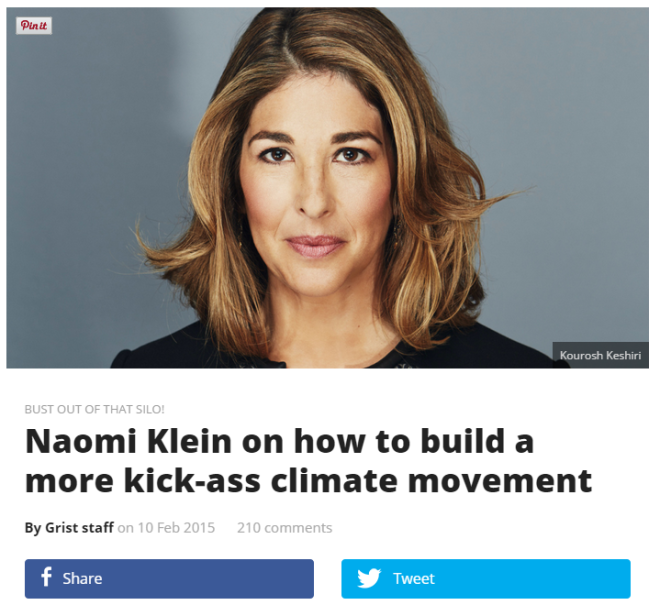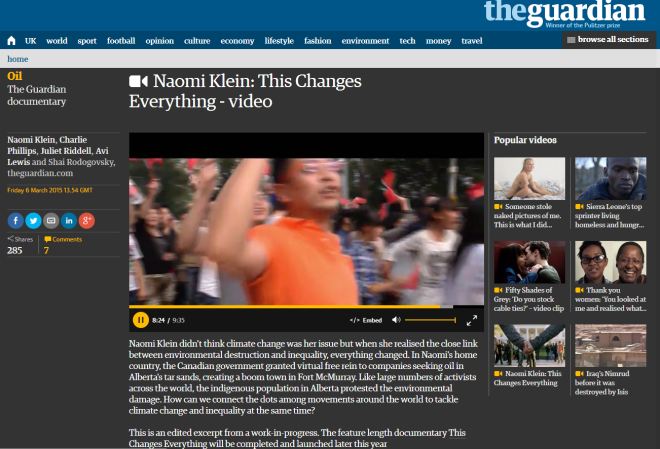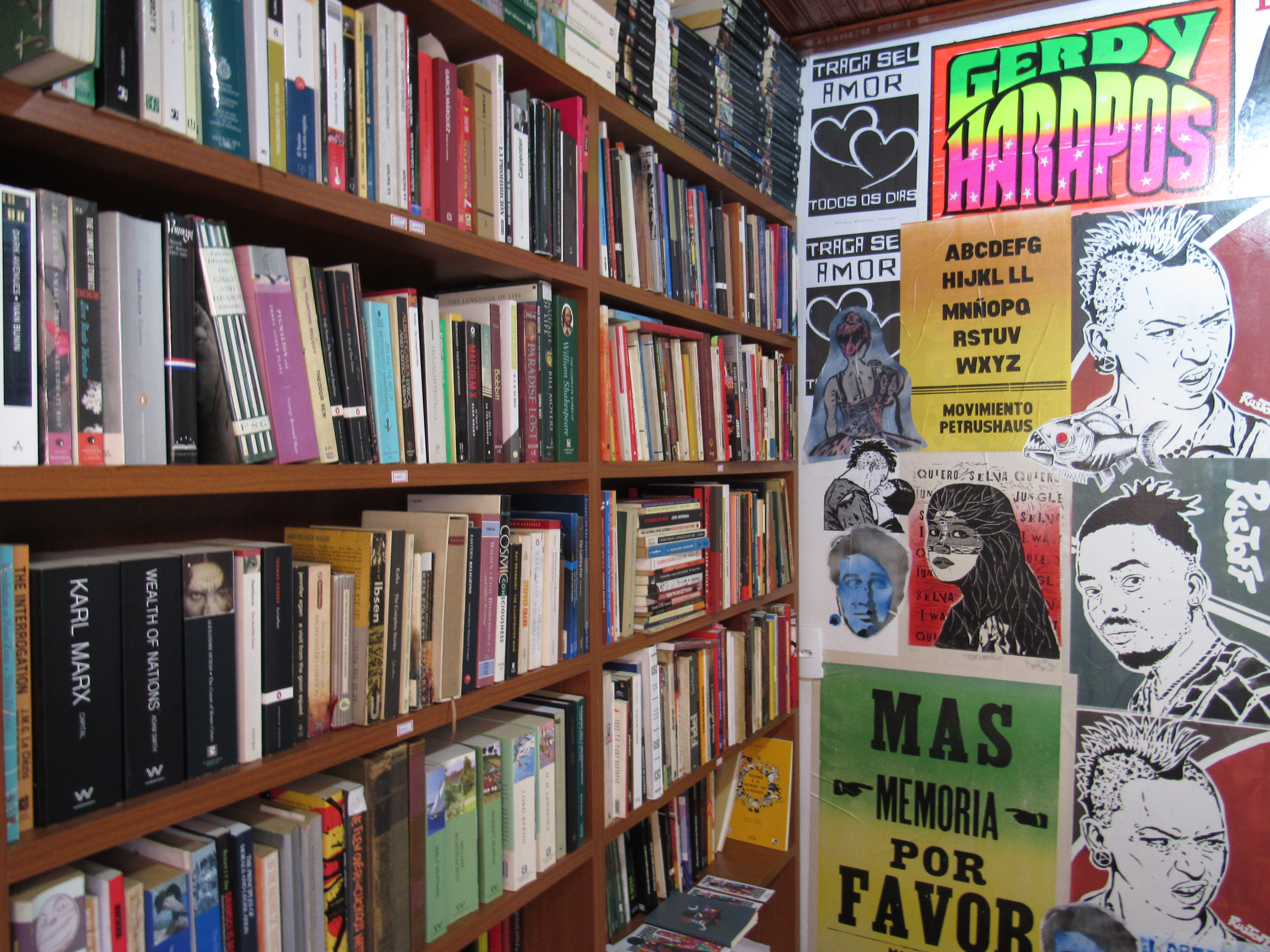“O fundamentalismo de mercado sabota sistematicamente nossa resposta coletiva à crise climática”, afirma autora e ativista canadense Naomi Klein em seu novo livro, “This Changes Everythin”
Art by Evgeny Parfenov
“Time is tight, to be sure. But we could commit ourselves, tomorrow, to radically cutting our fossil fuel emissions and beginning the shift to zero-carbon sources of energy based on renewable technology, with a full-blown transition underway within the decade. We have the tools to do that. And if we did, the seas would still rise and the storms would still come, but we would stand a much greater chance of preventing truly catastrophic warming. Indeed, entire nations could be saved from the waves.
So my mind keeps coming back to the question: what is wrong with us? I think the answer is far more simple than many have led us to believe: we have not done the things that are necessary to lower emissions because those things fundamentally conflict with deregulated capitalism, the reigning ideology for the entire period we have been struggling to find a way out of this crisis. We are stuck because the actions that would give us the best chance of averting catastrophe – and would benefit the vast majority – are extremely threatening to an elite minority that has a stranglehold over our economy, our political process, and most of our major media outlets. That problem might not have been insurmountable had it presented itself at another point in our history. But it is our great collective misfortune that the scientific community made its decisive diagnosis of the climate threat at the precise moment when those elites were enjoying more unfettered political, cultural, and intellectual power than at any point since the 1920s. Indeed, governments and scientists began talking seriously about radical cuts to greenhouse gas emissions in 1988 – the exact year that marked the dawning of what came to be called “globalisation,” with the signing of the agreement representing the world’s largest bilateral trade relationship between Canada and the US, later to be expanded into the North American Free Trade Agreement (Nafta) with the inclusion of Mexico.
The three policy pillars of this new era are familiar to us all: privatisation of the public sphere, deregulation of the corporate sector, and lower corporate taxation, paid for with cuts to public spending. Much has been written about the real-world costs of these policies – the instability of financial markets, the excesses of the super-rich, and the desperation of the increasingly disposable poor, as well as the failing state of public infrastructure and services. Very little, however, has been written about how market fundamentalism has, from the very first moments, systematically sabotaged our collective response to climate change.”
Naomi Klein
This Changes Everything
@ The Guardian
You might also enjoy:
“When you see the people on the streets of Rio and São Paulo fighting for affordable public transit, it doesn’t matter if they call themselves climate activists. They are climate activists. Because affordable public transit is central to any just transition.
My hope is that the labor movement, the anti-cuts movement, the climate movement will really come together in a coherent demand for a just transition away from fossil fuels, using [the oil] price shock as the catalyst.
(…) I feel like it almost needs to be simple enough to fit on a postcard: What is it that we’re fighting for? We’re fighting to leave it in the ground: no new fossil fuel frontiers. We’re fighting for societies powered by 100 percent renewable energy. We’re fighting for free public transit. We’re fighting for the principle that polluters should pay, that how we pay for the transition has to be justice-based. We’re fighting for the principle of frontlines first, that the people who got the worst deal in the old economy should be the first in line to benefit in the new economy. Those are some principles that we can all agree on and rally behind.
That’s my hope for 2015.”
Naomi Klein
* * * * *
[youtube id=http://youtu.be/sKTmwu3ynOY]
* * * * *
A CÚPULA DO CLIMA EM 2015 OCORRE EM PARIS E BILL McKIBBEN COMENTA NO GUARDIAN:
“Pressure is growing. In fact, that relentless climate movement is starting to win big, unprecedented victories around the world, victories which are quickly reshaping the consensus view – including among investors – about how fast a clean energy future could come. It’s a movement grounded in the streets and reaching for the photovoltaic rooftops, and its thinking can be easily summarised in a mantra: Fossil freeze. Solar thaw. Keep it in the ground.
Triumph is not certain – in fact, as the steadily rising toll of floods and droughts and melting glaciers makes clear, major losses are guaranteed. But for the first time in the quarter-century since global warming became a major public issue the advantage in this struggle has begun to tilt away from the Exxons and the BPs and towards the ragtag and spread-out fossil fuel resistance, which is led by indigenous people, young people, people breathing the impossible air in front-line communities. The fight won’t wait for Paris – the fight is on every day, and on every continent.” Bill McKibben,The Guardian
(De fato, não dá pra esperar a salvação destas Cúpulas do Clima das Elites, que a portas fechadas pretendem definir novos rumos para a economia global, mas sempre fracassam retumbantemente com o quase-nada de diferença que fazem; quem fará a diferença em Paris, se alguém, serão as massas bradando nas ruas e as pressões dos cada vez mais fortes movimentos sociais “fossil free”, que demandam soluções imediatas para o caos climático global e as emissões tóxicas que prosseguem colocando-nos em marcha rumo a futuras catástrofes imensas e iminentes. 400.000 pessoas marcaram presença em 2014 na People’s Climate March em New York. Em 2015, o que esperar em matéria de mobilização popular na França?)
* * * * *
Veja também:
Publicado em: 12/03/15
De autoria: casadevidro247









2 cometários